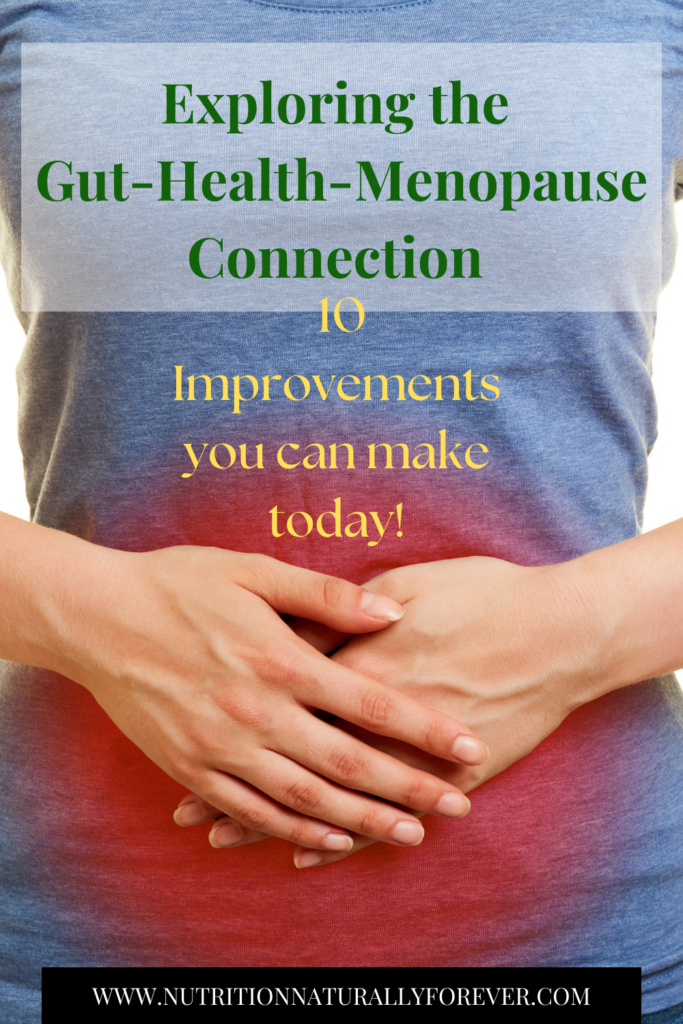
Top 10 Tips for Better Menopause Gut Health Now.
Menopause is a natural transition in a woman’s life from the Mother archetype to the Wild Woman (before becoming the Wise Woman in post-menopause) when our ovaries retire from making our sex hormones.
While menopause is widely recognised for its hormonal changes along with 34 (official) menopause symptoms such as hot flashes, joint pain, brain fog and mood swings, its impact on gut health is an emerging area of interest.
In this blog post, we’ll delve into menopause gut health, addressing the gut-hormone connection as well as answering questions like whether low estrogen can cause digestive problems, the influence of gut health on estrogen levels, whether probiotics can help with low estrogen, and the signs of low estrogen.
This intricate ecosystem of microorganisms may not only hold the secrets to navigating menopause but also living a longer, healthier life.
Understanding the Gut Microbiome Diversity
The gut microbiome consists of trillions of microorganisms, including bacteria, viruses, fungi, and other microbes, residing in the gastrointestinal tract.
There are more organisms in our gut than cells in our whole body.
It’s a dynamic and diverse community that not only aids in digestion but also interacts with our immune system, influences metabolism, and plays a pivotal role in overall health thanks to the gut-brain axis.
Good Gut Health During Menopause
Let’s start by looking at some of the areas that a healthy microbiome can support your journey through menopause;
Inflammation Control:
Chronic inflammation is a known driver of ageing and age-related diseases.
The gut microbiome exerts control over inflammation through its influence on the immune system.
A balanced gut flora helps to regulate the body’s inflammatory response, potentially reducing menopause symptoms and supports a healthy lifespan.
Nutrient Absorption:
Menopause symptoms often come with reduced nutrient absorption efficiency.
An imbalanced gut microbiome can exacerbate many issues you may be experiencing.
Beneficial gut bacteria assist in the absorption of essential nutrients, supporting the body to repair and renew cells.
You aren’t what you eat, you are what you absorb.
Oxidative Stress Reduction:
Harmful bacteria in the gut can produce reactive oxygen species (ROS), leading to oxidative stress and cellular damage.
A balanced microbiome helps minimise ROS production, potentially slowing down the ageing process.
Immune System Support:
The gut microbiome plays a crucial role in training the immune system.
A diverse and well-balanced gut microbiome helps maintain immune system function as we age, reducing susceptibility to infections and chronic diseases.
Hormonal Harmony:
Gut health influences hormonal balance and can therefore have a massive impact on how your body copes with the menopause transition.
A balanced microbiome can help mitigate hormonal imbalances associated with ageing in general.
Can Estrogen Dominance Cause Digestive Problems?
High estrogen levels, relative to progesterone, can contribute to digestive issues that many women experience during perimenopause and menopause.
This imbalance, known as estrogen dominance, can impact the gastrointestinal tract in several ways.
The imbalance of reproductive hormones can lead to:
- Sluggish Digestion: Estrogen dominance may slow down digestive transit time, which can result in constipation, bloating, and general discomfort.
- Increased Sensitivity: Some women may notice heightened sensitivity to certain foods or develop food intolerances due to hormonal imbalance, making digestion less smooth.
- Gastrointestinal Symptoms: Symptoms such as acid reflux, nausea, and changes in appetite can be linked to elevated estrogen levels, especially when unbalanced by progesterone.
What Are Signs of Estrogen Dominance?
Identifying signs of estrogen dominance can be challenging, especially during perimenopause when hormone levels fluctuate widely.
Although estrogen levels can drop, when they fluctuate it can be as much as three times the usual levels causing mild to debilitating symptoms in the body.
However, some common indicators of estrogen dominance include:
- Heavy or Irregular Periods: High estrogen can cause heavy, prolonged, or irregular menstrual cycles.
- Breast Tenderness: Elevated estrogen often leads to swelling or soreness in the breast tissue.
- Mood Changes: Estrogen dominance can contribute to mood swings, irritability, and heightened anxiety.
- Sleep Disturbances: Difficulty falling or staying asleep is often linked to high estrogen, particularly if progesterone levels are low.
- Weight Gain: Estrogen dominance may contribute to weight gain, especially around the hips and waist.
- Digestive Issues: As mentioned earlier, bloating, constipation, and acid reflux can also be signs of elevated estrogen.
Can Gut Health Affect Estrogen Levels?
Yes, gut health can influence estrogen levels through a process known as the “gut-estrogen connection.”
The gut contains a diverse community of bacteria (see below for more information), collectively referred to as the gut microbiota or gut flora.
This microbiota plays a crucial role in metabolising and recycling estrogen in the body. Here’s how it works:
- Estrogen Metabolism: The liver breaks down estrogen into various forms, some of which are more active than others. The gut microbiota can further modify these estrogen metabolites.
- Estrogen Reabsorption: In the small and large intestine, estrogen metabolites can be reabsorbed into the bloodstream or excreted from the body. The composition of the gut microbiota can influence this process.
- Balance is Key: An imbalance in the gut microbiota, known as dysbiosis, can potentially lead to impaired estrogen metabolism, which may contribute to hormonal imbalances during menopause.
Through my personal experience and work with women to improve menopause symptoms and overall health, I developed the SHIFT System.
I use this unique system in my Menopause Solution Session and 12-week SHIFT Method Program to create a personalised pathway based on each woman’s lifestyle and specific menopause experience.
The pathway includes 8 essential steps. These steps include optimising liver and gut health to reduce symptoms of estrogen dominance and promote balanced hormone health.
Specific Gut Bacteria Strains and Their Roles
To improve your gut health in menopause you need to focus on populating your microbiome with a variety of good bacteria;
Akkermansia muciniphila
This beneficial bacterium has gained attention for its potential anti-ageing properties. It’s associated with improved metabolic health, reduced inflammation, and a healthier gut lining. Higher levels of Akkermansia muciniphila are linked to better ageing outcomes. https://doi.org/10.1016/j.phrs.2023.106687
Bifidobacterium longum
This probiotic strain is known for its anti-inflammatory properties and its ability to support gut barrier function. It may contribute to reduced inflammation and improved nutrient absorption in older individuals.https://doi.org/10.1016/j.jff.2020.103938
Lactobacillus acidophilus
This probiotic strain is recognised for its role in maintaining gut health and promoting the production of certain vitamins. It may help maintain a balanced gut flora as we age. 10.3892/etm.2016.3406
Faecalibacterium prausnitzii
Low levels of this beneficial bacterium are associated with inflammatory bowel diseases and ageing-related inflammation. Promoting the growth of Faecalibacterium prausnitzii may help reduce inflammation and support gut health. 10.1038/pr.2016.167
Probiotic supplements are quite common and easy to get hold of these days, however, these can not only be expensive but some are not worth their price tag.
Just adding a supplement to your healthy lifestyle may not be enough. Too many bacteria can cause unwanted side effects plus you also have to make sure you are feeding the new population the correct nutrients so that they thrive.
Improving Gut Health in Menopause
Now that we understand the profound link between menopause gut health let’s explore practical strategies to support a healthy gut considering the roles of specific strains.
Here are 10 ways to improve your gut health in menopause today;
- Prebiotics and Probiotics: Incorporate prebiotic-rich food sources (fibre) and probiotics (fermented foods, and supplements if appropriate) to nurture a diverse and beneficial gut flora. Look for strains like Bifidobacterium, Lactobacillus, and Faecalibacterium.
- Diet: Consume a well-balanced diet rich in whole foods, including fruits, vegetables, lean proteins, and healthy fats. Strive to eliminate ultra-processed foods, vegetable and seed oils and chemicals such as artificial sweeteners, which can disrupt the gut microbiome.
- Polyphenol-Rich Foods: Polyphenols found in foods like berries, green tea, and dark chocolate have antioxidant and anti-inflammatory properties that benefit the gut microbiome, potentially supporting specific strains. Polyphenols also benefit women’s health by supporting the correct use of hormones by the body, blood sugar balance, heart health and improved cognitive function.
- Regular Exercise: Physical activity promotes gut microbial diversity and helps maintain gut health. It may also support specific strains associated with longevity.
- Stress Management: Chronic stress negatively impacts the gut microbiome. Incorporate stress-reduction techniques like meditation, yoga, or mindfulness practices, which may favour beneficial strains.
- Adequate Hydration: Proper hydration is essential for a healthy gut and overall well-being, potentially supporting specific gut microbes.
- Limit Antibiotics: Use antibiotics judiciously and only when necessary to avoid disturbing the gut microbiota, including specific strains.
- Sleep Quality: Aim for 7-9 hours of quality sleep per night to support gut health and overall vitality, potentially benefiting specific strains. (Waking up at 3 AM? Read this post).
- Environmental Toxins: Minimise exposure to environmental toxins, which can disrupt the gut microbiome and specific strains within it. Think about chemicals you clean with, products you put on your skin and even items such as candles which can give off harmful fumes.
- Personalised Approach: Consider personalised dietary and lifestyle strategies tailored to your unique body and menopause experience. Book a free Wild Well-being call to discuss your unique lifestyle.
Conclusion
The connection between menopause and gut health is a fascinating area of study.
Estrogen dominance can indeed cause digestive problems, and gut health can affect estrogen and progesterone levels.
Everything is connected.
However, despite what you might hear through the media and well-meaning friends and family reaching for hormone replacement therapy doesn’t have to be inevitable.
Many of the debilitating menopause symptoms women experience are due to an undernourished body thanks to years of poor nutritional advice seeing us count calories rather than focusing on nourishment, punishing our bodies in various ways and burning the candle at both ends to be everything to everyone.
The body is run by hormones, not calories.
Reviewing your lifestyle and focusing on the root causes of hormone disharmony such as gut health along with detox pathways and adrenal health can support you to design a lifestyle that supports your menopause health naturally without HRT and other medications with their inevitable side effects.
If you would like to explore what this looks like for you Book a free (no obligation) Wild Well-Being call to chat about your unique menopause journey, and come away feeling motivated and inspired to embrace menopause and the rest of your life.
If you would like to learn more about the foods you can eat to improve the function of your liver and gut health and reduce inflammation in your body then download my free ebook 5 Nutrients Your Body Needs During Menopause.


Such an interesting read thank you.
Thank you for taking the time to read this post, I hope it gave you some tips 💚